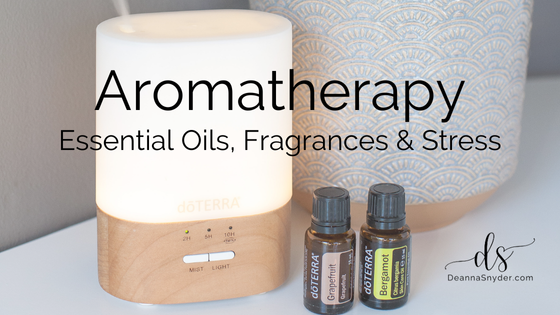Aromatherapy. Essential Oils, Fragrances & Stress
Saturday April 10, 2021

How Are Scents and Emotions Related?
We may not realize it, but scents play a huge role in how we feel and think. There is a scientific explanation for the connection between our emotions and the smells we encounter.
Our olfactory system, or sense of smell, has an immediate connection to a particular part of the brain that acts as our emotional processing center, the amygdala. The direct connection between our olfactory system and the amygdala is the reason why smells like rain, citrus fruits, and fresh-cut grass make us feel a certain way, or may even bring up specific memories.
The Scoop on Fragrances
Please don't confuse store-bought synthetic fragrances with the power of aromatherapy. Store-bought synthetic fragrances (candles, wax, plug-ins, fabric spray, etc), can certainly make us and our homes smell delightful, but these added scents and fragrances are harmful to our bodies.
Fragrances are linked to a number of health risks. Research has shown that the chemicals used to make fragrances are classified as allergens, hormone disruptors, asthma triggers, neurotoxins, and carcinogens. Who knew? Before I learned this, I had a candle and/or plugin in every room, and the smellier the laundry detergent and fabric softener the better! I had no idea that they were doing harm to me, my husband, and fur babies.
Fragrance chemicals can pass from the skin into our circulatory system. Did you know that anything we put on our skin is absorbed in about 30 seconds and then is circulated throughout out body in about 30 minutes? That is a powerful statement.
Be vigilant when you are reading the labels of ingredients. Often you will see the word "fragrance" listed. That one word, fragrance, can hide a combination of more than 100 toxic ingredients. Often these fragrances are the "trade secret" ingredient for that company and are proprietary.
As I mentioned earlier, fragrances are linked to a number of health risks. The number one change you can do to reduce your family's exposure to toxic chemicals is to avoid them.
Now you may say, "but I love things to smell wonderful?!" No worries, I got you! Let me introduce you to the world of doTERRA's Certified Pure Tested Grade essential oils. Remember not all essential oils are created equally. All store-bought essentials are adulterated and are in the same category as fragrances. They do more harm and are not therapeutic despite what the label indicates.
How Do Essential Oils Affect Emotions?
Essential oils are concentrated amounts of the aroma compounds found in various plants. Because essential oils produce potent aromas, they can be powerful tools for influencing your mood and emotions.
Bergamot and Stress
One of the most important feelings to be aware of is emotional and physical tension, or, stress. Stress is how we respond to anything challenging in our environment. Even perfectly healthy people experience emotional stress and tension, but when it gets out of hand, stress may have negative impacts on your mental and physical health.
Essential oils make an excellent contribution to a stress-relieving environment. The doTERRA Science team recommends Bergamot for anyone that needs a natural, aromatic experience as they unwind at the end of the day. You can also try massaging Bergamot onto the skin with Fractionated Coconut Oil for a few moments of emotional self-care.*
Introduction
If you don't have a diffuser on your desk at work and on your nightstand at home, you don't know what you're missing. One of the safest and most cost-efficient ways to relax and increase positive feelings is through inhalation of essential oils. A recent study by the scientists at doTERRA put the mood-enhancing properties of CPTG® Bergamot essential oil to the test-in a very stressful environment.
The Bergamot Study
The belief in Bergamot essential oil's mood influencing capabilities is not new. Previous research has provided strong evidence that it can be uplifting and stress-reducing when inhaled in a number of different environments.1-4 These effects are thought to be due primarily to Bergamot's rich concentration of the monoterpenes limonene, linalyl acetate, and linalool.
doTERRA's scientists aimed to examine how Bergamot essential oil diffusion would influence mood in the waiting room of a mental health treatment center.5 During the eight-week trial, four waterless diffusers were set up out of sight in the waiting room 15 minutes before patients arrived. Weeks 1, 3, 5, and 7 were essential oil diffusion periods, while on weeks 2, 4, 6, and 8, the diffuser was filled with only distilled water. The 57 participants were asked to sit in the waiting room for a total of 15 minutes and were asked to complete a validated questionnaire before proceeding to their appointment.
A total of 45 participants completed the questionnaire during the trial essential oil diffusion periods, while 12 were completed during the distilled water diffusion periods (control). It was found that those in the trial group reported higher positive affect scores (17 percent higher) and slightly lower increases in negative affect scores (they reported a smaller increase in negative thoughts) compared to the control group. There were also no adverse reactions to the diffusion. These findings were consistent with existing research on the influence of Bergamot essential oil aromatherapy in other environments.
Conclusion
Long day at the office? Kids stressing you out? All of us experience stress and discomfort at one point or another. As research shows, a few drops of Bergamot in your diffuser may be a great option to promote positive thinking and a sense of calm.
I invite you to contact me for more information and you will receive an Aromatic Use of Essential Oils eBook.
Until the next time.
Be well, Deanna
Peace. Love. Oils.


